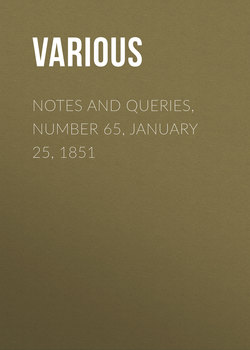Читать книгу Notes and Queries, Number 65, January 25, 1851 - Various - Страница 9
NOTES
MINOR NOTES
ОглавлениеProclamation of Langholme Fair.—In an old paper I find the following proclamation of a fair, to be held in a town in Scotland; it may, perhaps, amuse some of your numerous readers:—
"O yes! and that's a time. O yes! and that's twa times. O yes! and that's the third and last time: All manner of pearson or pearsons whatsoever let 'em draw near, and I shall let you ken that there is a fair to be held at the muckle town of Langholme, for the space of aught days; wherein if any hustrin, custrin, land-louper, dukes-couper, or gang-y-gate swinger, shall breed any urdam, durdam, brabblement, or squabblement, he shall have his lugs tacked to the muckle trone, with a nail of twal-a-penny, until he down of his hobshanks and up with his mucle doubs, and pray to heaven neen times, Gold bles the king, and thrice the muckle Lord of Relton, pay a groat to me Jammey Ferguson, bailiff of the aforesaid manor. So ye heard my proclamation, and I'll haam to dinner."
Perhaps some of your correspondents north of the Tweed can give the meaning (if there be any) of a few of the choice expressions contained in this document.
MONKBARNS.
Seats in Churches.—The following curious notice of seats in churches occurs in Thompson's History of Swine; which is quoted by him from Whitaker's Whalley, 2nd edit. 4to. p. 228.:—
"My man Shuttleworth, of Harking, made this form and here will I sit when I come; and any cousin Nowell may make one behind me, if he please, and my son Sherburne shall make one on the other side; and Mr. Catteral another behind him; and for the residue the use shall be, first come first speed; and that will make the proud wives of Whalley rise betimes to come to church."
Which seems to convey the idea, that it was at that time customary for persons to make their seats in the churches. Query, When did pews come into general use?
R.W.E.
Hull.
[The earliest notice of pews occurs in the Vision of Piers Plouman, p. 95., edit. 1813:—
"Among wyves and wodewes ich am ywoned sute
Yparroked in puwes. The person hit knoweth."
See also The History of Pews, a paper read before the Cambridge Camden Society, 1841.]
Flemish Account.—T.B.M. (Vol. i., p. 8.) requests references to early instances of the use of this expression. In the History of Edward II., by E.F., written A.D. 1627 (see "NOTES AND QUERIES" Vol. i., pp. 91. 220.), folio edition, p. 113., I find "The Queen (Isabella) who had already a French and an Italian trick, was jealous lest she should here taste a Flemish one;" because she feared lest the Earl of Henault should abandon her cause. This instance is, I think, earlier than any yet referred to.
S.G.
Use of Monosyllables.—The most remarkable instance of the use of monosyllables that I remember to have met with in our poets, occurs in the Fire-worshippers in Lalla Rookh. It is as follows:—
"I knew, I knew it could not last—
'Twas bright, 'twas heav'nly, but 'tis past!
Oh! ever thus, from childhood's hour,
I've seen my fondest hopes decay;
I never lov'd a tree or flow'r
But 'twas the first to fade away.
I never nurs'd a dear gazelle
To glad me with its soft black eye,
But when it came to know me well,
And love me, it was sure to die!
Now, too—the joy most like divine
Of all I ever dreamt or knew,
To see thee, hear thee, call thee mine,—
Oh misery! must I lose that too?
Yet go! On peril's brink we meet;—
Those frightful rocks—that treach'rous sea—
No, never come again—tho' sweet,
Tho' Heav'n, it may be death to thee!"
This passage contains 126 words, 110 of which are monosyllables, and the remainder words of only two syllables. The sentiment embodied throughout is that of violent mental emotion; and it affords a further illustration of the correctness of MR. C. FORBES'S theory (Vol. i., p. 228.) that "the language of passion is almost invariably broken and abrupt."
HENRY H. BREEN.
St. Lucia, W.I., Nov. 1850.
Specimen of Foreign English.—
"RESTORATIVE HOTEL, FINE HOK.
KEPT BY FRANK PROSPERI,
FACING THE MILITARY QUARTER
AT POMPEII.
That hotel open since a very few days, is renowned for the cleanness of the apartments and linen; for the exactness of the service, and for the eccelence of the true french cookery. Being situated at proximity of that regeneration, it will be propitius to receive families, whatever, which will desire to reside alternatively into that town, to visit the monuments new found, and to breathe thither the salubrity of the air.
That establishment will avoid to all the travellers, visitors, of that sepult city, and to the artists, (willing draw the antiquities) a great disorder, occasioned by the tardy and expensive contour of the iron-whay. People will find equally thither, a complete sortment of stranger wines, and of the kingdom, hot and cold baths, stables and coach houses, the whole with very moderated prices. Now, all the applications and endeavours of the hoste, will tend always to correspond to the tastes and desires, of their customers, which will acquire without doubt, to him, in to that town, the reputation whome, he is ambitious."
